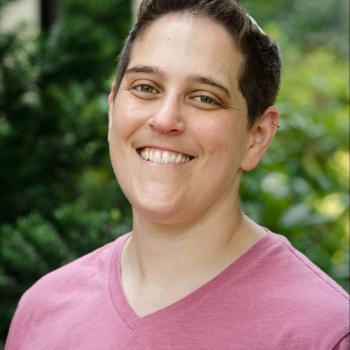Even outside of Hollywood, bearded heroes exist in iconography ranging from Jesus and the ancient prophets to Santa Claus. LDS artwork from Arnold Freiberg and others (which, despite one's opinion for or against, is undeniably prevalent in LDS houses of worship), has given us bearded Nephis, Almas, Abinadis, Helamans, and Captain Moronis. (See here for background and examples.)
To what, therefore, could Holt be referring when he claims that giving Woodhouse a beard was an "unconscious" and "stereotypical" choice? The answer is almost certainly Mormon culture. Somewhere along the line, Mormonism began to identify facial hair as evil on an "unconscious" and "stereotypical" level, at least cinematically. Surely, every Mormon can reference a benevolent mustachioed role model from their own Mormon life, but can they do so from Mormon cinema?
To be fair, The Work and the Glory series is not the first to implement the "evil beard." In Kevin Reynolds' The Count of Monte Cristo (2002), facial hair is openly symbolic of evil, but only in terms of the main character. At the beginning of the film, Edmond Dantes enjoys the innocence of his fortunate youth while completely beardless. But after betrayal at the hands of his supposed friends lands him in prison for several years, he grows an understandably great length of beard.
After his escape from the Chateau d'If and discovery of the treasure of Monte Cristo, Dantes returns to Paris with a groomed beard that serves two functions. First, it disguises him from all of his former associates. Second, and more importantly, it allows him to perform acts of heartless revenge.
How can this be traced to his beard? Simple. After revenging himself upon two of his adversaries, Dantes reveals himself to the third and most dastardly, Fernand Mondego, sans beard. Without his beard, not only is he suddenly recognized as the spectral Dantes, but his thirst for vengeance is sated and he's able to extend forgiveness to his most despicable rival. Without the beard to render him evil, Dantes now becomes the defender to Fernand's aggressor in the climactic battle. The film transforms author Alexandre Dumas' story from one of revenge to one of redemption and achieving the American Dream, as evidenced by the tale of Edmond Dante's beard.
But unlike The Count of Monte Cristo, wherein the symbol only applies to one character, the beard-as-evil iconography exists throughout the entire framework of The Work and the Glory series.
In the beginning, Benjamin Steed (Sam Hennings) and his two oldest sons, Joshua and Nathan (Eric Johnson and Alexander Carroll, respectively), are all clean-shaven, respectably-groomed adult males, despite their provincial lifestyle. With the exception of the first scene (in which Benjamin buys a farm in Palmyra from a bearded land agent), the first real appearance of a beard comes from Caleb Jackson (Marcus Hester) when Joshua goes into town to essentially see his love interest, Lydia McBride (Tiffany Dupont). Drunks and lechers -- mostly bearded men -- roam the docks, an area firmly established as disreputable, and this scene marks Joshua's initial flirtation with the evil that will later consume him (i.e., lead him to grow a beard). While Joshua comes across early on as an incarnation of Laman and Lemuel of old because of his murmuring attitude, it is nevertheless significant that the first person we actually see influencing him down a dark path is the bearded Caleb.
Of course, the most significant introduction to evil facial hair comes courtesy of the Murdocks -- Will and David (Phillip DeVona) -- and Mark Cooper (Jonathan Quint). After harassing Joseph Smith (Jonathan Scarfe) on a trip into town, they entice Joshua into drinking in a darkened setting and plotting about getting their hands on "Ol' Joe's gold bible." While this may seem sufficient enough to indicate their nefariousness, they also share another common bond: the beard. Later, along with several other bearded men, they accost Emma Smith (Sarah Darling) in the street, but the beardless Nathan defends her.
At this point, the argument for coincidence is just. However, as soon as Joshua is kicked out of his father's house, the uncanniness of the phenomenon only grows as Joshua begins to grow a beard. The conscious decision to have Jonathan grow a beard in accordance to his descent into darkness not only calls attention to his beard, but necessarily the beard of every other character in the film, and eventually, the series. Furthermore, the measure of Joshua's evil correlates exactly with the size of his beard.
At first, as Joshua begins to mingle with the Murdocks, it is nothing more than a shadow of indolent scruff. However, as plans begin to take shape to assault Joseph and steal his "golden bible," Jonathan's beard grows along with his stake in the plot. His evil initiative and facial hair evolve proportionately. This is not true of the Murdocks and their static facial hair, who begin following Joshua's orders once his beard is longer than Will's, i.e., his evil is greater. After fleeing Palmyra and becoming a wanted man, Joshua is next seen with a massive beard, helped along surely by the addition of modernly frowned-upon vices such as gambling and smoking.




